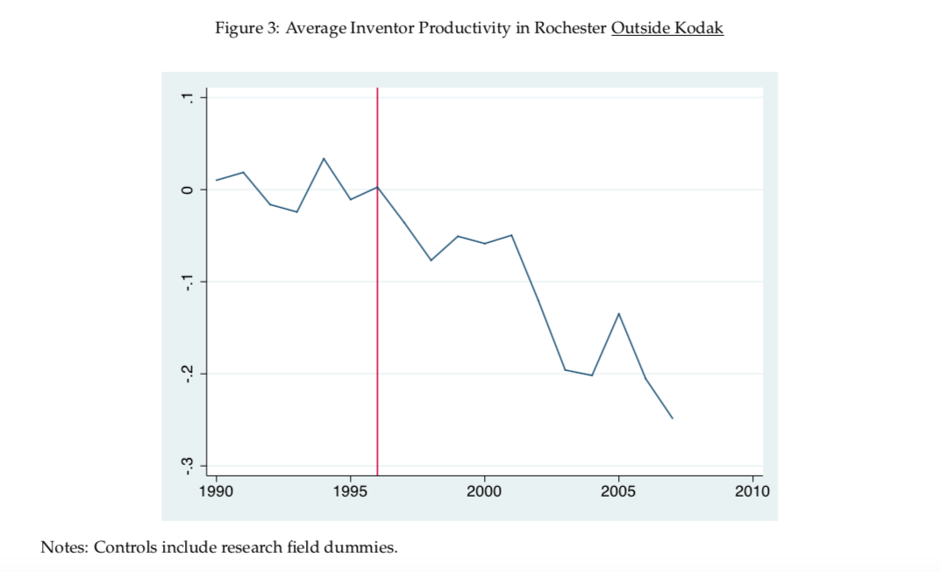Connecting state and local government leaders
New research finds that high-tech inventors are significantly more productive when they work in large clusters—but there are drawbacks.
The clustering force: It’s the big reason behind the comeback of cities, and perhaps the most powerful driver of the knowledge economy. Alfred Marshall identified the economic power of clustering, or agglomeration, way back in the 1890s. Jane Jacobs later documented its role in catalyzing innovation and propelling the wealth of cities. The Nobel Prize-winning economist Robert Lucas described it as the underlying engine of today’s knowledge-based creative economy.
Previous research has documented the importance of clustering to high-tech startups and industries. Now, in a new working paper from the National Bureau of Economic Research, economist Enrico Moretti of the University of California, Berkeley, examines the role of clustering on more than 4 million patents in high-tech fields that were filed and granted between 1971 and 2007, a period that spans the rapid evolution of the innovative knowledge economy.
More specifically, this study looks at the effects of clustering on roughly 100,000 star inventors who account for the top 10 percent of patents across three key high-tech fields: semiconductors, computer science, and biology, chemistry, and medicine. (The two additional broad fields considered are “other engineering” and “other science.”) Moretti tracks the concentration of high-tech patenting across 179 city-regions (defined as economic areas, similar to metros). He arrives at three main findings:
High-Tech Invention is Extraordinarily Concentrated in Just a Handful of Cities.
High-tech invention is extremely geographically concentrated. The top 10 city-regions account for nearly 60 percent of inventors in biology, chemistry and medicine, with greater New York and the San Francisco Bay Area accounting for more than 10 percent each. Seventy percent of inventors in computer science are in the top 10 regions; the Bay Area alone has more than one-quarter of them. And the top 10 regions account for almost 80 percent of inventors in semiconductors, with one-quarter again in the Bay Area and another 15 percent in greater New York.
This clustering of inventors has only increased over time, growing by about five percentage points for biology, chemistry, and medicine, 15 percentage points for computer science, and about 20 percentage points for semiconductors between 1971 and 2007.
Leading Cities for Inventors, 2007
|
Computer science |
Share of inventors |
|
San Jose-San Francisco-Oakland, CA |
26.2% |
|
New York-Newark-Bridgeport, NY-NJ-CT-PA |
9.1% |
|
Seattle-Tacoma-Olympia, WA |
8.4% |
|
Austin-Round Rock, TX |
6.0% |
|
Boston-Worcester-Manchester, MA-NH |
4.8% |
|
Semiconductors |
|
|
San Jose-San Francisco-Oakland, CA |
25.5% |
|
New York-Newark-Bridgeport, NY-NJ-CT-PA |
14.9% |
|
Los Angeles-Long Beach-Riverside, CA |
6.2% |
|
Dallas-Fort Worth, TX |
5.0% |
|
Phoenix-Mesa-Scottsdale, AZ |
5.0% |
|
Biology and chemistry |
|
|
New York-Newark-Bridgeport, NY-NJ-CT-PA |
11.4% |
|
San Jose-San Francisco-Oakland, CA |
11.2% |
|
Boston-Worcester-Manchester, MA-NH |
7.% |
|
Philadelphia-Camden-Vineland, PA-NJ-DE-MD |
6.3% |
|
Los Angeles-Long Beach-Riverside, CA |
5.9% |
High-Tech Inventors Gain Considerably From Being in Larger Clusters.
The second key finding is that inventors are significantly more productive when they are working in larger geographic clusters. The study finds that when inventors move from a smaller to a large cluster, they experience increases in both the number of patents they generate and the impact of those patents, based on their subsequent citations.
For example, a computer scientist who moves from the median cluster to a cluster at the 75th percentile in size would experience a 12 percent increase in productivity, while an inventor in biology and chemistry doing the same would see an 8.4 percent productivity gain. Overall, a just a 10 percent increase in the size of a cluster leads to a 0.66 percent increase in the number of patents produced by a top inventor each year.
Superstar or anchor firms can generate large benefits for their clusters. The study estimates that Microsoft’s presence generates a more than 8 percent productivity gain for inventors who are part of Seattle’s computer-science cluster. The flip side is also true: Clusters can be hit hard when anchor firms decline. To illustrate this, Moretti examines the impact of the decline of Kodak on the productivity on inventors in the Rochester, New York, tech cluster, comparing the effect of Kodak’s stock decline from 1996 to 2007 on inventors outside of Kodak but in Rochester, compared to inventors in other cities. Moretti estimates that Kodak’s decline caused a productivity loss of between 20 and 32 percent for these non-Kodak local inventors.

The U.S. Economy as a Whole Benefits From the Clustering of High-Tech Inventors and Inventions.
Third, the clustering of high-tech inventors brings real benefits to the American economy as a whole. To establish this, Moretti created a counterfactual scenario and compared the number of patents produced overall and in each major high-tech field to the number of patents that would be produced if inventors were spread more equally across cities. He estimates that the U.S. would produce about 11 percent fewer patents each year under such a scenario. The country would see a roughly 15 percent annual decline in semiconductor patents, a 13 percent decline in computer science, and a 10 percent decline in biology and chemistry, if the geography of inventors was more equal.
Losers and Winners From Equalizing Innovation Across Cities
|
Losers |
Productivity loss |
|
San Jose-San Francisco-Oakland, CA |
-22.5% |
|
New York-Newark-Bridgeport, NY-NJ-CT-PA |
-16.9% |
|
Seattle-Tacoma-Olympia, WA |
-16.5% |
|
Austin-Round Rock, TX |
-14.6% |
|
Boston-Worcester-Manchester, MA-NH |
-13.3% |
|
Winners |
Productivity gain |
|
New Orleans-Metairie-Bogalusa, LA |
34.9% |
|
Oklahoma City-Shawnee, OK |
25.4% |
|
Memphis, TN-MS-AR |
23.0% |
|
Toledo-Fremont, OH |
23.0% |
|
Scranton-Wilkes-Barre, PA |
21.2% |
Making the geography of patenting more equal would also imply winners and losers, lifting the position of some places and dampening the position of today’s leading high-tech hubs. Overall, the nation’s leading-edge clusters, those in the top 5 percent, would see a 15 percent decline in their productivity. The Bay Area would be the hardest hit, experiencing a 22.5 percent decline in its high-tech productivity. The hit to New York and Seattle would be 16 or 17 percent. Boston and Austin would see a 13 or 14 percent productivity drop.
But less advantaged places would gain. New Orleans would see its high-tech productivity rise by 35 percent, Memphis by 23 percent, and Omaha by 13 percent. The country’s most lagging city-regions, those in the bottom 25 percent, would see a productivity gain of more than 27 percent.
The upshot is this: When it comes to high-tech industry and invention, the U.S. economy faces something of a trade-off. If our high-tech economy were more equal, the country as a whole would be less productive. But we’d also be less defined by the kind of economic and cultural fault lines that are driving us further apart.
Richard Florida is a co-founder and editor at large of CityLab and a senior editor at The Atlantic.

NEXT STORY: States Can Craft Own Net Neutrality Rules, Appeals Court Rules



